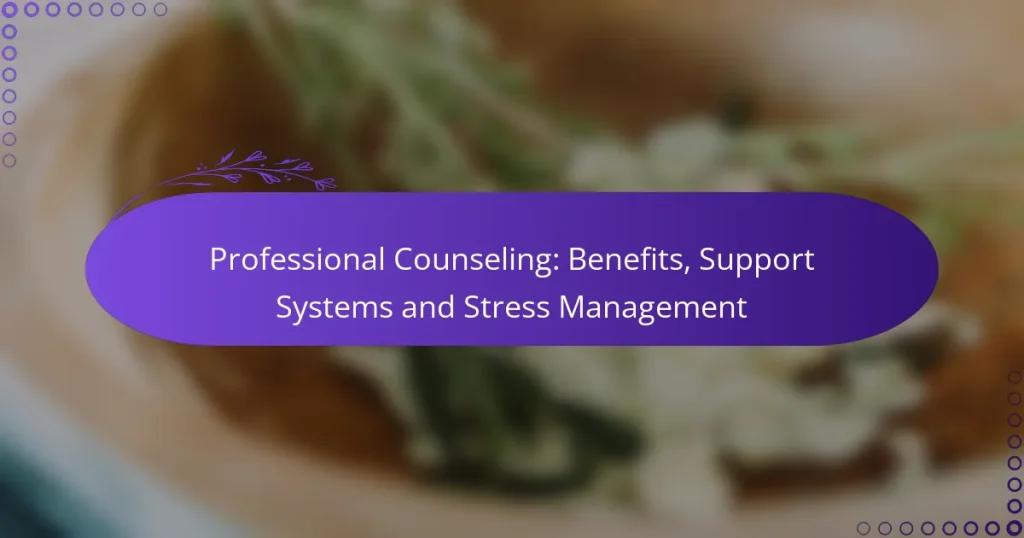Professional counseling plays a crucial role in enhancing mental health by offering personalized support and effective strategies for managing emotional challenges. By engaging in structured sessions, individuals can gain valuable insights into their thoughts and behaviors, ultimately leading to improved well-being. Additionally, counseling provides essential support systems and tools for stress management, empowering clients to identify triggers and develop resilience against stressors.

How can professional counseling improve mental health?
Professional counseling can significantly enhance mental health by providing tailored support and strategies to manage emotional challenges. Through structured sessions, individuals can gain insights into their thoughts and behaviors, leading to improved overall well-being.
Enhanced emotional support
Professional counseling offers a safe space for individuals to express their feelings and experiences without judgment. Counselors provide empathetic listening, which can help clients feel understood and validated, reducing feelings of isolation.
This emotional support can be particularly beneficial during difficult life transitions, such as grief, divorce, or job loss. By discussing these challenges with a trained professional, individuals can process their emotions more effectively and develop resilience.
Improved coping strategies
Counselors equip clients with practical coping strategies to manage stress and anxiety. These strategies may include mindfulness techniques, cognitive-behavioral approaches, or problem-solving skills tailored to individual needs.
For example, a counselor might teach relaxation exercises to help manage acute stress or guide clients in reframing negative thoughts. Implementing these strategies can lead to a more balanced emotional state and better handling of life’s pressures.
Increased self-awareness
Engaging in professional counseling fosters greater self-awareness by encouraging individuals to explore their thoughts, feelings, and behaviors. This introspection can reveal underlying patterns that contribute to mental health issues.
As clients gain insight into their motivations and reactions, they can make more informed choices and develop healthier habits. Increased self-awareness often leads to improved relationships and a deeper understanding of personal goals.
Access to professional resources
Counselors provide access to a wealth of professional resources, including therapeutic techniques, educational materials, and referrals to specialists if needed. This comprehensive support can enhance the effectiveness of the counseling process.
Clients may also benefit from group therapy sessions or workshops that address specific issues, such as anxiety management or relationship skills. Utilizing these resources can complement individual therapy and promote holistic mental health improvement.

What types of support systems are available in counseling?
Support systems in counseling include various therapeutic approaches designed to address individual needs and promote mental well-being. These systems can range from one-on-one sessions to group settings, each offering unique benefits and dynamics.
Individual therapy
Individual therapy involves one-on-one sessions between a counselor and a client, focusing on personal issues and goals. This setting allows for a deep exploration of thoughts, feelings, and behaviors, providing a safe space for clients to express themselves without judgment.
Clients often benefit from tailored strategies that address their specific challenges, such as anxiety, depression, or trauma. It’s essential to establish a strong rapport with the therapist to foster trust and openness, which can significantly enhance the therapeutic process.
Group therapy
Group therapy consists of a small group of individuals led by a trained therapist, allowing participants to share experiences and support one another. This format can reduce feelings of isolation and provide diverse perspectives on common issues.
Group sessions typically focus on specific themes, such as coping skills or grief, and can be particularly effective for those who thrive in social settings. Participants should be prepared to engage actively and respect confidentiality to create a supportive environment.
Family counseling
Family counseling involves multiple family members working together with a therapist to address relational dynamics and improve communication. This approach recognizes that issues often affect the entire family system, not just the individual.
Sessions may include discussions about roles, conflicts, and patterns that contribute to stress within the family. It’s crucial for all members to participate willingly and openly to facilitate healing and understanding among family members.

How does counseling help with stress management?
Counseling assists with stress management by providing individuals with tools and strategies to cope with stressors effectively. Through professional guidance, clients learn to identify their stress triggers, develop relaxation techniques, and build resilience against future stress.
Identifying stress triggers
Understanding what causes stress is the first step in managing it. Counselors help clients pinpoint specific stressors, which can range from work pressures to personal relationships. This awareness allows individuals to address these triggers directly, either by changing their environment or altering their responses.
Common stress triggers include deadlines, financial concerns, and family dynamics. Keeping a stress diary can be an effective method to track these triggers, noting when stress levels rise and what events precede them.
Developing relaxation techniques
Relaxation techniques are essential for managing stress effectively. Counselors often teach methods such as deep breathing, progressive muscle relaxation, or mindfulness meditation. These techniques help individuals lower their physiological stress responses and promote a sense of calm.
Practicing these techniques regularly can lead to significant improvements in stress levels. For instance, dedicating just a few minutes each day to deep breathing exercises can help reduce anxiety and improve overall well-being.
Building resilience
Resilience is the ability to bounce back from stress and adversity. Counseling can enhance resilience by equipping individuals with coping strategies and a positive mindset. Clients learn to view challenges as opportunities for growth rather than insurmountable obstacles.
Building resilience involves fostering a supportive network, setting realistic goals, and maintaining a healthy lifestyle. Engaging in social activities and physical exercise can also strengthen resilience, making it easier to handle future stressors effectively.

What qualifications should I look for in a counselor?
When seeking a counselor, prioritize their qualifications, including licensure, certifications, and areas of specialization. These factors ensure that the counselor is equipped to provide effective support tailored to your needs.
Licensure and certifications
Always verify that a counselor holds the appropriate licensure for your region, such as Licensed Professional Counselor (LPC) or Licensed Clinical Social Worker (LCSW) in the United States. Certifications from recognized organizations, like the National Board for Certified Counselors (NBCC), can also indicate a higher level of expertise.
Licensure requirements vary by state or country, so familiarize yourself with local regulations. For instance, in Europe, the European Certificate in Psychotherapy (ECP) may be a relevant credential to consider.
Specialization areas
Counselors often specialize in specific areas such as anxiety, depression, family therapy, or substance abuse. Identifying a counselor with expertise in your particular concern can enhance the effectiveness of your sessions.
Consider asking potential counselors about their specialization during initial consultations. This can help you gauge whether their approach aligns with your needs and expectations.
Experience and client reviews
Experience is crucial when selecting a counselor. Look for professionals with several years of practice, particularly in the areas relevant to your situation. A seasoned counselor is likely to have encountered a range of issues and can provide more nuanced support.
Client reviews and testimonials can offer valuable insights into a counselor’s effectiveness and style. Check online platforms or ask for references to get a sense of their reputation and client satisfaction levels.

What are the costs associated with professional counseling?
The costs of professional counseling can vary significantly based on factors such as location, the counselor’s qualifications, and the type of therapy provided. Understanding these costs can help individuals make informed decisions about their mental health care.
Session fees
Session fees for professional counseling typically range from about $50 to $250 per hour, depending on the therapist’s experience and the region. Urban areas generally have higher rates compared to rural locations. Some therapists may offer longer sessions or specialized services, which can also affect pricing.
When considering session fees, it’s essential to inquire about what is included, such as assessments or follow-up communications. This can help clarify the total cost of care and avoid unexpected expenses.
Insurance coverage options
Many health insurance plans provide coverage for mental health services, which can significantly reduce out-of-pocket costs. However, the extent of coverage varies widely, so it’s crucial to check with your insurance provider to understand your benefits.
Some common aspects to verify include the number of sessions covered, any required copays, and whether the therapist is in-network. This information can help you budget for your counseling needs effectively.
Sliding scale fees
Sliding scale fees are a payment option offered by some therapists based on a client’s income and financial situation. This approach allows individuals to receive counseling services at a reduced rate, making mental health care more accessible.
To take advantage of sliding scale fees, discuss your financial circumstances with the therapist during the initial consultation. Many therapists are willing to negotiate fees to accommodate clients who may struggle to afford standard rates.


